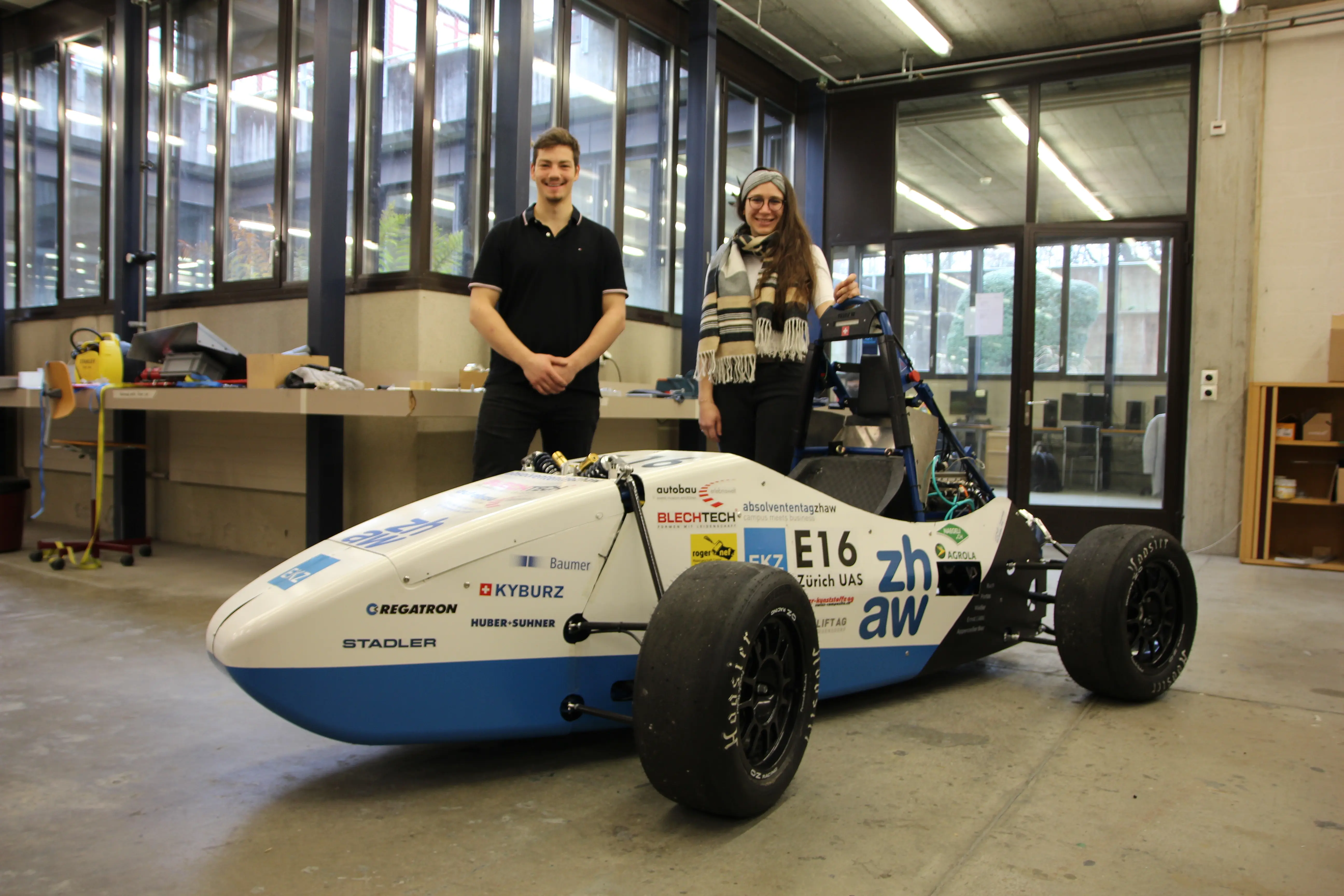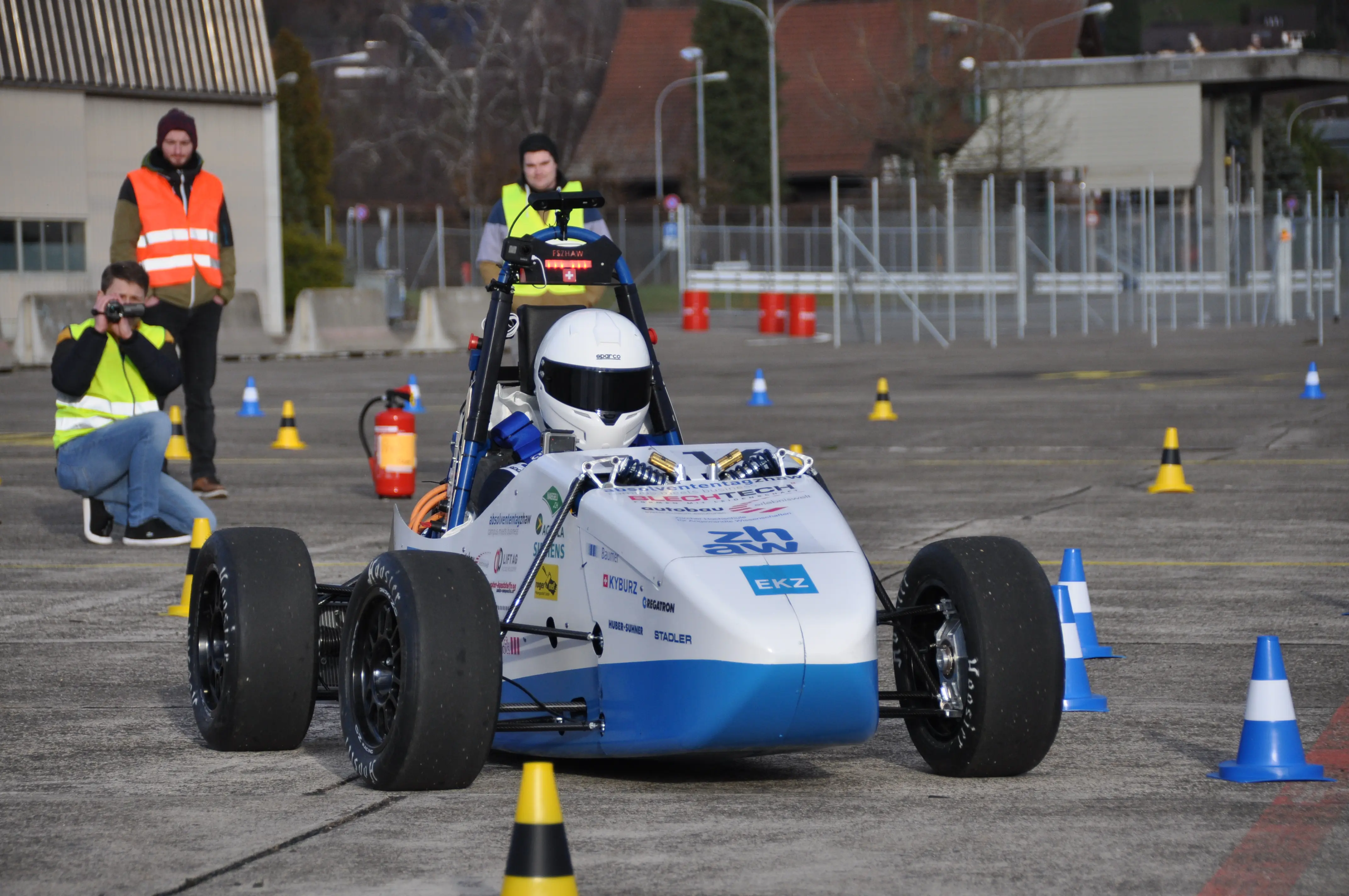The Zurich UAS Racing team is getting ready to race in 2022!
The Zurich University of Applied Sciences (ZHAW) has had its own Formula Student team Zurich UAS Racing since 2019, but a combination of the coronavirus pandemic and a technical fault has so far prevented them from fully taking part in a race. They are determined to put that right in 2022. The 50 members of the team are highly motivated and are currently developing a new electric racing car – one that can take to the grid with or without a driver.

Design and build a racing car, find sponsors, then race it on the track as efficiently and affordably as possible: that is the challenge facing the teams in the international Formula Student motor racing series. And at ZHAW, the Zurich UAS Racing team of over 50 students across a wide range of roles are currently making final preparations to tackle it. Most of the members of this cross-disciplinary team are drawn from the School of Management and Law and the School of Engineering. Students volunteer to help out as freelancers or to work with the team on final year and research projects, the topics for which are decided every semester by the team and university teaching staff. The team generates 20 project reports, 20 Bachelor’s theses and three to five in-depth study reports, as well as the occasional Master’s thesis every year.

The team have already designed and built their first electric racing car. This year, they will compete with a new electric racer, which is also capable of driving itself. Most of the development work for the new car has already been completed. Zurich UAS Racing CEO Robin Schumacher and COO Anika Nyfeler both study Aviation at the ZHAW School of Engineering. Schumacher has been involved in the team since 2020, while Nyfeler joined last August. Both are confident that the team will finally be able to take part in races this year, after their first season came to an end before it had even begun. As Schumacher remembers: “We couldn’t get into our workshop because of Covid – and that wasn’t the only reason. We didn’t have any parts to build the car with anyway, because there was so much disruption to worldwide supply chains.”
First Covid, then technical problems
The team had planned to take their electric racer to Croatia last summer, but that plan also fell apart: “Two days before the race, the charger for the car caught fire in our workshop”, says Schumacher. “Luckily, no one was injured.” The fire also heated up the battery. As there was a risk of the battery cells spontaneously igniting, it subsequently had to be stored in a safety cabinet for 72 hours for safety reasons. That meant the car was unable to compete in Croatia, but the Zurich UAS Racing team still took part in the event, collecting points in the off-track disciplines of cost analysis, engineering design and business planning. The trip also gave the team a chance to collect plenty of valuable experience that they were later able to use for the design and build of the new car.
New car was ready in early May
At the end of December, the students finally got the chance to put their car through its paces at Dübendorf airfield. As Schumacher explains: “For 2022, the car needs to be able to drive itself and have an electric drive system.” That is one reason why only a some of the parts can be carried over from the old car to the new one. The car had to be be completed by late April, or early May at the absolute latest. However, since success in Formula Student depends on sticking to your business plan as well as being quick on the track, the team have to keep a careful eye on their spending and find suitable sponsors to fund their efforts. On top of that, they are also expected to plan marketing campaigns, which requires excellent teamwork from a big team. “We have nine people just in the Operations Team”, explains Nyfeler.
Plans for up to four races in 2022
The team are in good spirits ahead of their 2022 campaign: “It’s true that delivery times are still very long, but at the moment we are in really good shape,” Schumacher says. “We are very happy with the way testing has gone.” The team are aiming to attend three to four races in 2022. “We will definitely be at the Swiss round of Formula Student, which will be held at Dübendorf from 13 to 17 July”, says Schumacher. The team have also qualified for the German round of the series, which is considered the most difficult race to qualify for and will be held from 15 to 21 August. They secured their spot on the grid via a competition known as “Quizday”, where teams are tested on their knowledge of the series’ rules and regulations and asked to solve various mathematical problems. The field for the races in Spain and Croatia will be determined on a first-come, first-served basis, so registering early will be key. The team also plans to use this year to invest more time in the components it has already started to develop for future racing cars.
The race car
The new race car can be driven by a driver and is also capable of driving itself. It is powered by a 600-volt current and produces 70 kilowatts of power from two wheel-hub motors at the rear. The tubular frame chassis is made of carbon-clad steel, and the whole package tips the scales at 240 kilos. Robin Schumacher and Anika Nyfeler say that the costs associated with building the car are comparable with the price of a Mercedes S-Class, but, as Schumacher points out, “that puts us lower mid-table.”